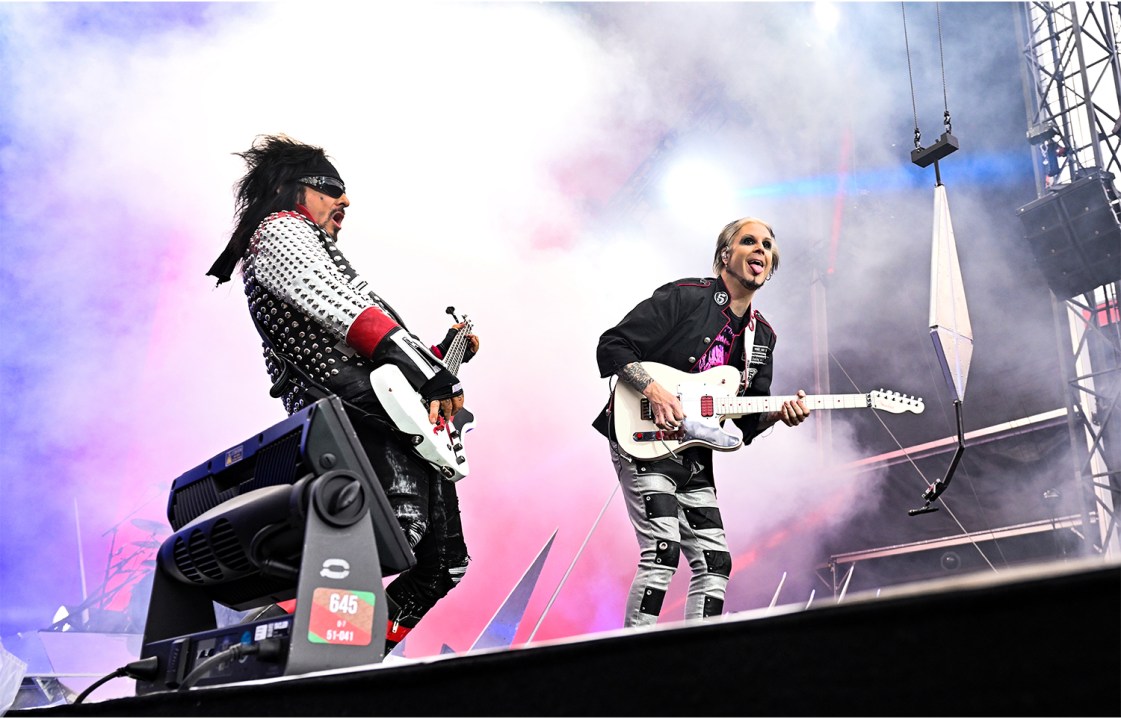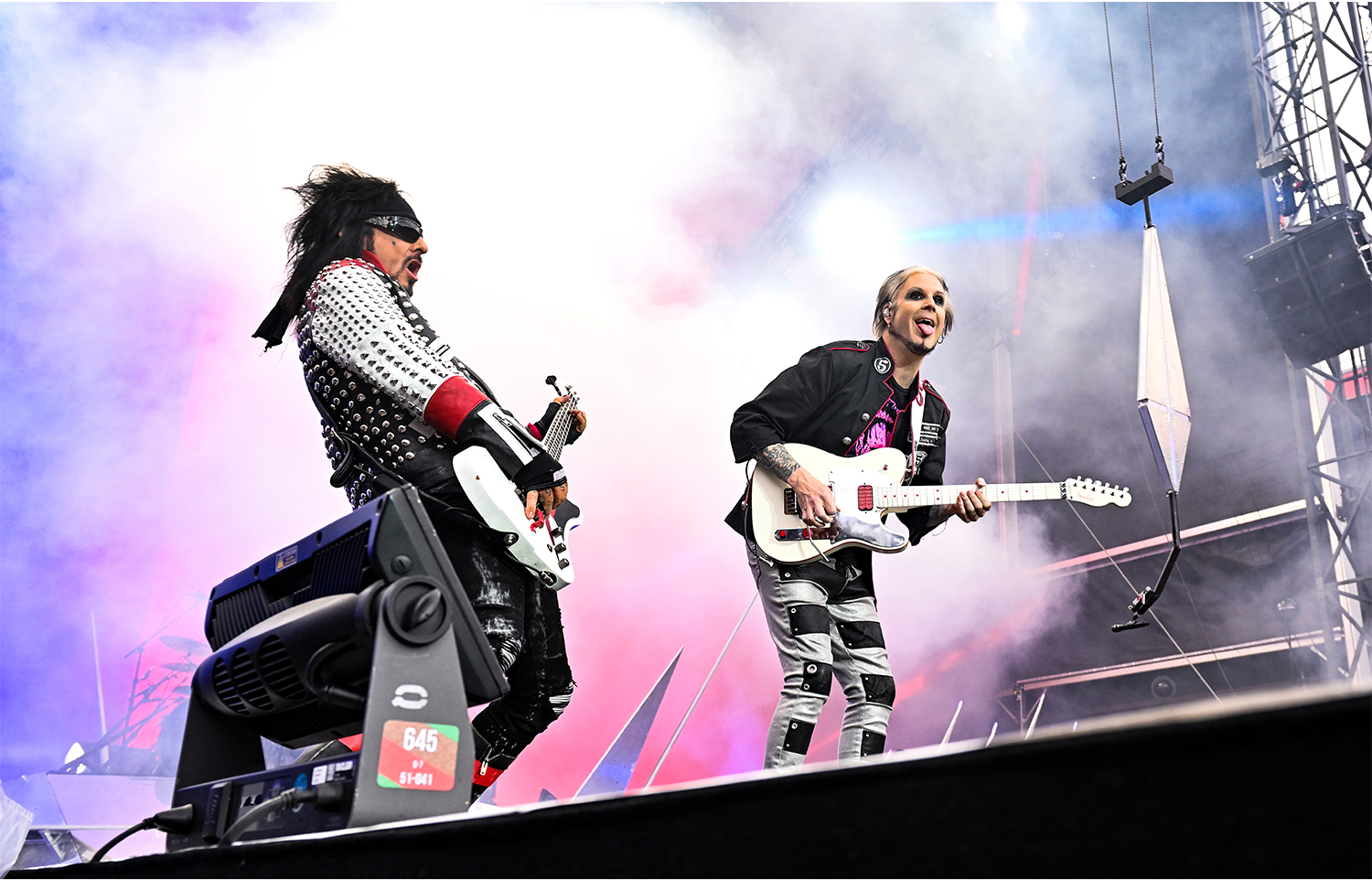I’m not sure I’ve ever seen anything worse than Mötley Crüe in Sheffield. Nothing more tuneless, empty, vapid and dismaying. The Los Angeles glam-metal band became superstars in the 1980s, largely by wearing lots of make-up and doing terrible things, but I’ve never understood why. Even those who weren’t repulsed by the band members’ behaviour and personalities surely couldn’t have detected any actual tunes in there.
At Bramall Lane, with a viciously loud PA, the few melodies that were there were largely undetectable. And the band – now in their sixties – still gloried in their obnoxious infantilism. Late in the set, drummer Tommy Lee – the one who was in the sex tape with Pamela Anderson – came to the front of the stage and appealed for women to lift their tops up to be shown on the big screens. Several did, including one older woman, flatter of chest than the others. ‘We got us some man titties!’ yelled Lee. The face on the screen sank.
Mötley Crüe still gloried in their obnoxious infantilism
Def Leppard, by contrast, have aged remarkably gracefully. Their albums Pyromania (1983) and Hysteria (1987) are among hard rock’s biggest records, because – unlike Crüe – they really cared about songwriting and song construction, which they learned at the feet of their producer, Robert John ‘Mutt’ Lange, the great starmaker of 1980s and ’90s rock. Also, they remain delightful people (I have had several dealings with them in the past few years, and I have no hesitation in calling them the most helpful and reasonable major rock stars I have ever dealt with).
They were also too loud, but because the songs have proper melodies, it didn’t all descend into a swirl of noise. Leppard have always maintained that they had as much in common with pop as with metal, and so many of these songs could be reimagined – the none-more-1980s power ballad ‘Love Bites’, for example, could easily be rearranged into a Scandi-sad disco banger. Unlike Mötley Crüe, too, they keep on working and recording, and if ‘Take What You Want’ and ‘Kick’ don’t quite scale the heights of ‘Photograph’ or ‘Animal’, they’re still better than anything the Americans managed in their 90 minutes.
In Sheffield there was a lot of black clothing, a lot of make-up (both sexes) and a lot of cleavage (both sexes). In Brockwell Park, for the one-day indie festival Wide Awake, there were a lot of young men with terrible moustaches, which made them look like 1970s TV presenters with skeletons in their closet. It was a funny old event: the two big stages seemed to be filled with acts who weren’t quite big enough for the space (though the main headliner, Caroline Polachek, has become this year’s big hipster-pop crossover hope), while the tents seemed to be filled with acts too big for the space. I was desperate to see the excellent duo Jockstrap, but had to leave the tent after one song, because it was distressingly uncomfortable (people ended up being hoisted out of the crowd, passed out).
And in bright sunshine, even the thrillingly noxious Viagra Boys, from Sweden, with their songs about research chemicals, lost a lot of their grimy allure. There are certain kinds of music that simply demand roofs and darkness, and without the sense of enclosure a venue provides the songs simply swirl away into the ether.
The much-buzzed-about Bar Italia, for example, might well have bored me rigid had I watched them from a picnic blanket in the sunshine. But in the darkness of a gloomy ICA they were transfixing. The things that would have driven me mad at a festival – no talking to the audience, po-faced seriousness – worked completely. They are signed to the venerable indie label Matador, and they sounded exactly like a band on Matador from 25 years ago: all spindly, spidery guitar lines, quavery and questioning vocals, and plenty of quiet.
It’s a bit of a blank canvas but that blankness, I suspect, is part of their appeal – I saw a tweet from someone, praising them for not ‘having a story’ on which to sell themselves (regular readers of the music press will know that ‘having a story’ is considered essential; during the great public-mental-illness boom of seven or eight years ago, there were bands who were told to have some mental-illness stories to sell themselves to the media). They just make their beautiful, off-kilter music, and let you unfold your own stories on top. Their new album, Tracy Denim, is fantastic.







Comments